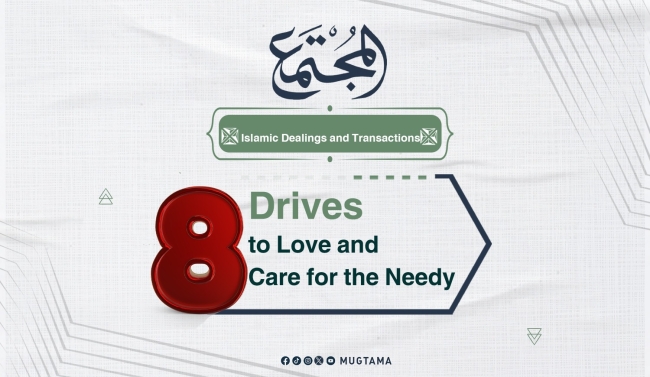The poor and the needy share characteristics of weakness, humility, and the inability to earn enough to meet their essential needs. When either term is mentioned independently, it implies both of them together. However, when mentioned together, each term has a distinct meaning despite their shared characteristics of need and vulnerability. The difference is that the poor are financially destitute and have no wealth whatsoever, while the needy may have some wealth, but it is insufficient to fulfill their needs and may also be internally humble and have a rich heart.
Islam invites believers to love the needy, whether this refers to financial hardship or inner emotional vulnerability. This is evidenced by the fact that the Prophet (peace and blessings be upon him) prayed to Allah to make him live as a needy, even though he sought refuge from poverty, which supports the view that the need primarily pertains to the heart rather than material conditions, although it does not exclude them.
Manifestations of Loving the Needy
- Respect and Appreciation: By showing true brotherhood in interactions and refraining from contempt or belittling them.
- Support and Assistance: By providing for their essential needs without causing harm or boasting about one's generosity.
- Accompanying and Engaging with Them: By visiting, interacting, and involving them in suitable tasks.
Motivations for Loving and Helping the Needy
- Worshiping Allah
Allah commanded benevolence towards the needy. He says, “Worship Allah and associate nothing with Him, and to parents do good, and to relatives, orphans, and the needy.” (An-Nisa: 36) Allah also said: “And give the relative his right, and [also] the poor.” (Al-Isra: 26) Additionally, Allah commanded the Prophet (peace and blessings be upon him) to treat the needy with love and kindness. In Musnad Ahmad, Abu Dharr al-Ghifari narrated: “My most beloved person- the Prophet – may peace and blessings of Allah be upon him- ordered me to love the poor and be close with them.” Meaning to keep the needy in one’s consideration, loving them, being near them, checking on their conditions, striving to meet their needs, and safeguarding their interests to alleviate their hardship and share their burdens.
- Following the Example of the Prophet
The Prophet (peace and blessings be upon him) loved the needy and openly declared this to the people. Allah even commanded him to pray for this, as mentioned in Sunan at-Tirmidhi, where Ibn Abbas reported that the Messenger of Allah (peace and blessings be upon him) said: “I saw my Lord tonight in the most beautiful form. He addressed me by name, and said, when you pray, say: 'O God, I ask Thee for power to do good things and abandon objectionable things, for love towards the poor.'” Thus, the Prophet (peace and blessings be upon him) would supplicate for Allah to grant him a life and death among the needy and to be resurrected with them on the Day of Judgment.
- Embodiment of Noble Ethical Values
Loving the needy nurtures numerous ethical values promoted by Islam, as it requires a Muslim to empathize with, be compassionate toward, and assist the needy. It is a noble act that represents the true spirit of human values at their finest.
- Fostering Societal Cohesion
The needy are part of society, just like anyone else. They need support and inclusion. Without this, they may become sources of harm or resentment. When love and kindness prevail, such negativity is eliminated, fostering societal cohesion and building strong relationships based on respect and appreciation.
- Encouragement to Show Gratitude for Blessings
In Sunan Ibn Majah, authenticated by Al-Albani, Abu Hurairah reported that the Messenger of Allah (peace and blessings be upon him) said: “Look to one who is lower than you, and do not look to one who is above you. For indeed that is more worthy (so that you will) not belittle Allah's favors upon you.” Reflecting on the needy and the blessings they lost motivates one to remember these blessings and be grateful for them, which leads Allah to increase His bounty, as He says, “And [remember] when your Lord proclaimed, 'If you are grateful, I will surely increase you [in favor].'” (Ibrahim: 7)
- Protection from Allah’s Punishment
Allah has warned of severe punishment for those who neglect the needy. He described one of the reasons for entering Hell Fire, saying: “Nor did he encourage the feeding of the poor.” (Al-Haqqah: 34) The people of Hell admitted their neglect by saying as mentioned in the Quran: “Nor did we used to feed the poor.” (Al-Muddathir: 44)
- Closeness to Allah on the Day of Resurrection
In Sunan at-Tirmidhi, authenticated by Al-Albani, Anas reported that the Messenger of Allah (peace and blessings be upon him) said: “O 'Aishah! Love the needy and be near them, for indeed Allah will make you near on the Day of Judgement.”
- Being Among the Righteous
Allah described the righteous inhabitants of Paradise as those who perform specific deeds, including feeding the poor and those in need. He says, “And they give food in spite of love for it to the needy, the orphan, and the captive, [saying], 'We feed you only for the countenance of Allah. We wish not from you reward or gratitude. Indeed, We fear from our Lord a Day austere and distressful.' So Allah will protect them from the evil of that Day and give them radiance and happiness, and will reward them for what they patiently endured with a garden [in Paradise] and silk [garments].” (Al-Insan: 8-12)
Therefore, Al-Bukhari narrated that Nafi' said: “Ibn `Umar never used to take his meal unless a poor man was called to eat with him.” The Prophet (peace and blessings be upon him) also prohibited feeding the needy with food that people would not desire. In Musnad Ahmad, Aisha (may Allah be pleased with her) narrated: “A lizard was brought to Allah's Messenger (ﷺ) but he neither ate that nor did he prohibit it. I said, 'Shall we not give it to the poor?' He said, 'Do not feed them what you do not eat yourselves.'”
-------------------------------------------------------------


